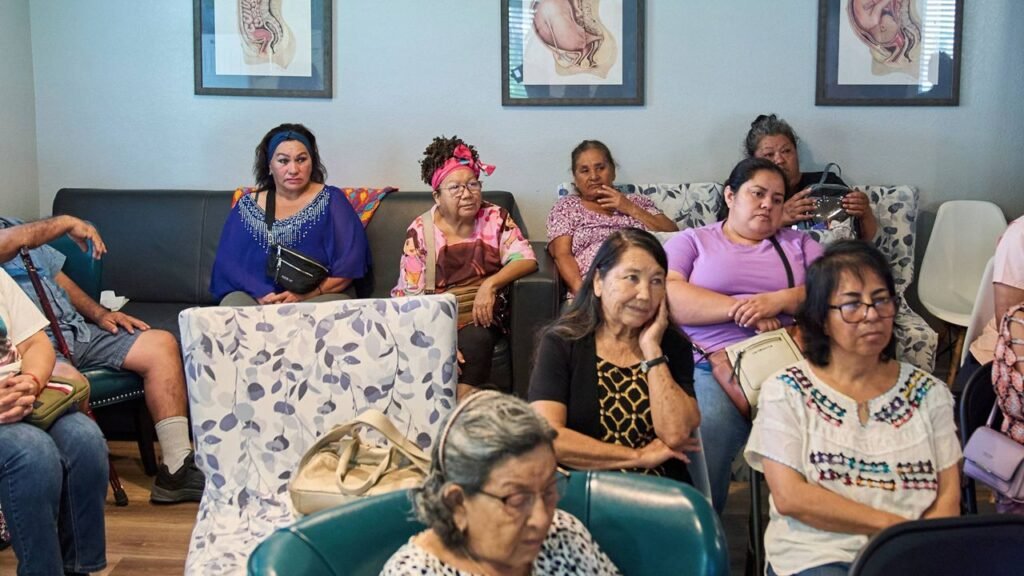Fear and Health Care: The Challenges Facing Immigrants in the Rio Grande Valley
Understanding the Fear of Seeking Medical Care
In rural Weslaco, Texas, many families are grappling with a dual challenge: the necessity of medical care and the looming threat of deportation. For individuals like Juanita, a 41-year-old mother from Mexico, every outing is a calculated risk. After living in the United States for over two decades, she has witnessed the tightening grip of immigration enforcement policies under the Trump administration, making even a trip to the pharmacy fraught with peril. With her prediabetic condition and the responsible care for her daughter, who has Down syndrome, Juanita confronts a stark reality—seeking help may come at too high a cost.
The Current Immigration Climate
The southern tip of Texas, particularly the Rio Grande Valley, has long been home to a vibrant Latino community. Yet, as deportation activities escalate nationwide, many immigrants, regardless of their legal status, hesitate to seek necessary medical care. This anxiety is compounded by recent regulations that require emergency room staff to inquire about patients’ immigration status, further discouraging individuals from accessing health care services.
A Community in Need
The Rio Grande Valley is one of the poorest and unhealthiest regions in the United States. With nearly half of the population classified as obese and a quarter living in poverty, the community is desperately in need of medical attention. Diseases such as diabetes and cervical cancer disproportionately affect residents, who often lack health insurance. This dire situation prompts an urgent question: How can immigrant families prioritize health while fearing deportation?
The Impact of Federal Policies
Federal immigration agents, driven by a directive to remove undocumented immigrants, have expanded their reach into everyday settings, including hospitals and churches. This aggressive approach has left many afraid to visit traditional health care venues. Local experts like Sandra de la Cruz-Yarrison, who runs a community clinic, describe a palpable sense of fear among families, leading to stagnation in seeking timely medical care.
Health Inequities
Residents in the Rio Grande Valley grapple with a myriad of health issues. As one of the most medically underserved areas in the country, it faces alarming statistics:
- Approximately one out of every four individuals lives with diabetes.
- Women are at a higher risk for cervical cancer, while elderly populations see increased incidents of dementia.
The fear associated with deportation exacerbates these existing medical crises, making it even more critical for solutions to be identified.
Avoiding the Doctor: Stories from the Community
Elvia, a local resident, exemplifies this struggle. Despite being legally in the U.S., her fear of exposing family members who lack legal status keeps her from enrolling in health coverage, affecting her well-being. Similarly, healthcare facilities have seen a steep decline in patient numbers since the current administration took office, with many unwilling to risk exposing themselves or their families to immigration authorities.
Real-Life Consequences
Maria Isabel de Perez recounts a harrowing experience when her son postponed seeking medical attention for severe stomach pains due to the fear instilled by rumors of immigration enforcement at local hospitals. Ultimately, this delay resulted in an emergency situation, nearly costing him his life.
Another community member, Maria, has reduced her interactions with the public out of fear. Previously active in her community, she now only ventures out to volunteer at a food bank, ensuring her children do not miss out on essential nutrition. Unfortunately, her daughter has also missed crucial appointments for depression medication, further illustrating the cascading impact of fear on family health.
A Critical Decline in Health Care Access
As a direct result of these anxieties, community clinics are experiencing a downturn in visits. The mobile clinic that once traversed the colonias is now idle, embodying the barrier that fear has erected between families and the health services they desperately need.
Conclusion: Bridging the Gap in Health Care Access
The challenges that immigrant families face in the Rio Grande Valley underscore an urgent need for systemic change. With health care becoming increasingly inaccessible due to fears of deportation, public health initiatives must adapt to meet the unique needs of these communities. Organizations and policymakers must consider the intersection of immigration policy and health care access to ensure that every individual can receive the care they deserve.
Call to Action
Community members and advocates must unite to create a supportive environment that encourages health-seeking behaviors among immigrants. Open dialogues about immigration and health care are essential for overcoming the barriers that impede access to treatment, particularly in at-risk populations.
By fostering a climate of understanding and safety, we can empower our communities to prioritize health and well-being.
For more information on the impact of immigration on health care access, consider checking sources like the American Public Health Association or National Immigration Law Center.


